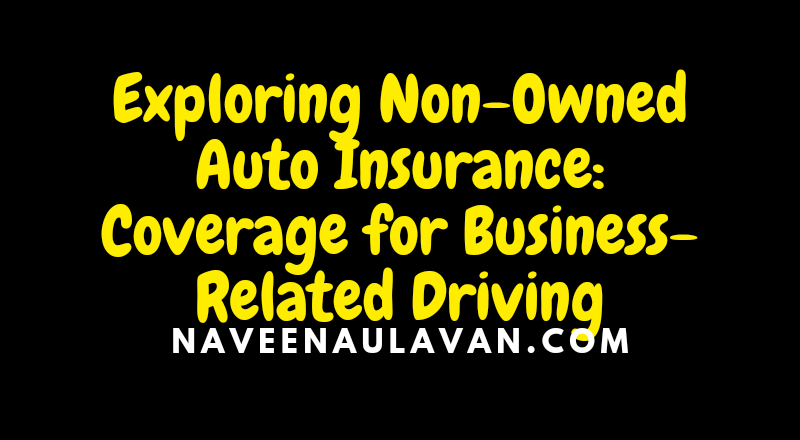In today’s hyper-connected business world, employees often find themselves driving for work-related purposes. From attending client meetings to making deliveries, business-related driving has become an integral part of many industries. However, when employees use their personal vehicles for work, it raises the question of insurance coverage. This is where non-owned auto insurance comes into play. This article will delve into the intricacies of non-owned auto insurance, exploring its definition, coverage options, benefits, and considerations for businesses.
What is Non-Owned Auto Insurance?
Non-owned auto insurance is a specialized form of insurance coverage designed to protect businesses and their employees when they use personal vehicles for work-related activities. It provides liability coverage for accidents or damages that may occur while the employee is driving for business purposes. It is important to note that non-owned auto insurance only covers the liability of the business, not the employee’s personal vehicle.
The Need for Non-Owned Auto Insurance
When employees use their personal vehicles for business, they may assume that their personal auto insurance policy will cover any accidents or damages that occur during work-related driving. However, personal auto insurance policies typically exclude coverage for accidents that occur while using the vehicle for business purposes. This leaves businesses exposed to potential liabilities and financial risks.
Coverage Options
Non-owned auto insurance policies typically provide two primary types of coverage: liability coverage and uninsured/underinsured motorist coverage.
Liability Coverage
Liability coverage protects businesses from claims made by third parties for bodily injury or property damage caused by the employee’s use of a personal vehicle for work. This coverage helps cover legal costs, settlements, or judgments arising from such claims.
Uninsured/Underinsured Motorist Coverage
Uninsured/underinsured motorist coverage protects businesses and their employees in the event of an accident caused by another driver who doesn’t have insurance or has insufficient coverage. This coverage helps cover medical expenses, lost wages, and other damages when the at-fault driver cannot financially compensate for the injuries or damages incurred.
Benefits of Non-Owned Auto Insurance
Non-owned auto insurance offers several benefits for businesses that require employees to use personal vehicles for work-related driving.
Protection from Financial Liabilities
By securing non-owned auto insurance, businesses protect themselves from potential financial liabilities arising from accidents or damages that occur during work-related driving. Without this coverage, businesses could be held responsible for the costs associated with injuries or property damage caused by their employees.
Peace of Mind for Employees
When employees know that the business has non-owned auto insurance coverage, they have peace of mind knowing that they are protected while conducting work-related driving. This can lead to increased job satisfaction and morale among employees.
Compliance with Legal and Contractual Requirements
Certain industries, such as transportation or delivery services, may have legal or contractual requirements for businesses to carry non-owned auto insurance. By obtaining this coverage, businesses ensure compliance with these obligations and avoid potential penalties or contract breaches.
Considerations for Businesses
Evaluating Risks
Before purchasing non-owned auto insurance, businesses should evaluate the risks associated with their employees’ work-related driving. This includes considering the frequency and distance of driving, the nature of the industry, and the potential for accidents or damages. Such evaluation helps businesses determine the appropriate coverage limits and policy features.
Policy Exclusions
When selecting a non-owned auto insurance policy, businesses should carefully review the terms and conditions to understand any exclusions or limitations. Common exclusions may include driving under the influence, racing, or carrying hazardous materials. Understanding these exclusions is crucial to ensure that the policy adequately covers the business’s specific needs.
Coordination with Personal Auto Insurance
Businesses should inform employees about the limitations of their personal auto insurance when used for work-related driving. Communicating the need for non-owned auto insurance can help employees make informed decisions about their coverage choices and prevent potential gaps in insurance protection.
Cost Considerations
Non-owned auto insurance premiums vary based on factors such as the number of employees, driving records, and coverage limits. Businesses should consider the financial impact of these premiums and assess whether the benefits outweigh the costs. Comparing quotes from multiple insurance providers can help businesses find the most affordable and comprehensive coverage.
Conclusion
Non-owned auto insurance is a critical insurance coverage for businesses that require employees to use personal vehicles for work-related driving. It protects businesses from potential liabilities and offers peace of mind for both employers and employees. By carefully evaluating risks, understanding policy exclusions, coordinating with personal auto insurance, and considering the cost, businesses can make informed decisions about obtaining non-owned auto insurance that best suits their needs.
In conclusion, non-owned auto insurance is a valuable asset for businesses that have employees driving for work-related purposes. It provides the necessary protection against potential liabilities and ensures compliance with legal and contractual requirements. By understanding the coverage options, benefits, and considerations associated with non-owned auto insurance, businesses can make informed decisions to safeguard their operations and mitigate risks associated with business-related driving. Investing in non-owned auto insurance not only protects the business but also provides peace of mind for employees, ultimately fostering a safer and more efficient work environment.
